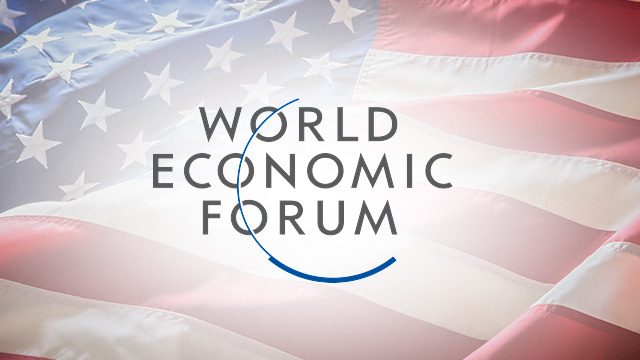SUMMARY
This is AI generated summarization, which may have errors. For context, always refer to the full article.

GENEVA, Switzerland – The United States has the world’s most competitive and innovative economy, a World Economic Forum ranking showed Wednesday, October 17, after a methodology shift helped unseat Switzerland after nearly a decade on top.
The organization that hosts the annual Davos pow-wow of business and political elites said it used a new methodology for the 2018 edition of its annual Global Competitiveness Report to reflect shifts in a world increasingly transformed by new, digital technologies.
This year’s report studied how 140 economies fared when measured against 98 indicators organized into 12 pillars, including institutions, infrastructure, macroeconomic stability, business dynamism and innovation capability.
“The United States achieves the best overall performance,” WEF said in a statement.
‘Innovation powerhouse’
“They’re an innovation powerhouse,” Saadia Zahidi, a member of the WEF’s managing board, told Agence France-Presse.
“They do well in terms of labor markets, they do well in terms of market size, they do fairly well in terms of institutions,” she said.
When asked if President Donald Trump could take credit for the ranking, Thierry Geiger, head of analytics and quantitative research at WEF, stressed that most of the data used in the report was from before Trump came to power last year.
“The things we capture are long-term drivers,” he told reporters.
Zahidi meanwhile said “there are also a lot of worrying signs” for US competitiveness.
She pointed to the country’s low score in terms of participation by women in the labor force, where it ranked 37th, as well as 40th place in terms of press freedom.
WEF also stressed the “importance of openness for competitiveness,” including low-tariff and non-tariff barriers to trade and ease of hiring foreign labor.
“The data suggest that global economic health would be positively impacted by a return to greater openness and integration,” WEF said.
Overall, the United States scored an average of 85.6 points when the nearly 100 indicators were measured on a scale of 0 to 100, and was followed by Singapore and Germany.
Switzerland meanwhile landed in fourth place, with a score of 82.6, after 9 years at the top of the WEF ranking.
On average, countries around the world scored 60 points on the ranking – a full 40 points away from what WEF considers the optimal conditions for a competitive economy.
WEF founder Klaus Schwab said understanding and being open to the technologies driving the so-called “fourth industrial revolution” was vital to a country’s competitiveness.
“I foresee a new global divide between countries who understand innovative transformations and those that don’t,” he said in a statement.
Zahidi however stressed that “technology is not a silver bullet on its own.”
“Countries must invest in people and institutions to deliver on the promise of technology.” – Rappler.com
Add a comment
How does this make you feel?
There are no comments yet. Add your comment to start the conversation.